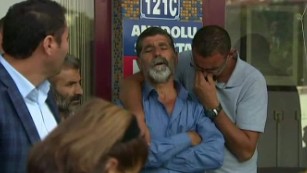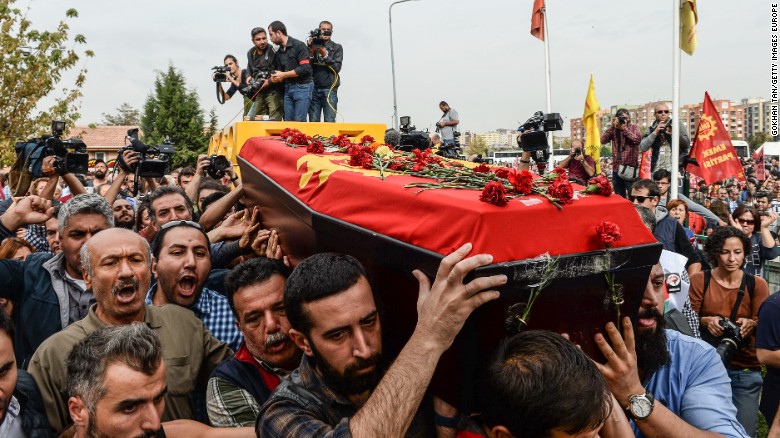Turkey bombings: ISIS focus of investigation, Prime Minister says
Though no group has claimed responsibility for the deadly weekend bombings in Ankara, the focus of the investigation is the Islamic extremist group ISIS, Turkey's Prime Minister said Monday.
Two suicide bombers are believed to have carried out Saturday's attack near Ankara's main train station, killing at least 97 people and wounding nearly 250 others, Turkey has said.
Authorities have begun to collect DNA samples from relatives of those suspected of having joined ISIS to help identify possible suspects in the bombings, Turkey's semiofficial Anadolu news agency reported.
Not specifically identifying any group behind the act, Prime Minister Ahmet Davutoglu told Turkish television station NTV on Monday, "We investigate Daesh (ISIS) as our No. 1 priority. There (has) been good progress toward identifying a name. That name points to an organization."
Davutoglu said his country had come face to face with suicide bombers a long time ago. "This attack will not turn Turkey into a Syria," he said.
The weekend blasts targeted crowds at a lunchtime peace rally calling for an end to the renewed conflict between the Kurdistan Workers' Party, or PKK, and the Turkish government.
Kurdish forces have been battling ISIS jihadists across a swath of northern Iraq and Syria, and the Turkish government recently changed its stance to allow the United States to launch strikes on the militant group's positions from Incirlik Air Base in southern Turkey.
Analysis: What does attack mean for Turkey?
'This is an attack on the whole of Turkey'

Turkey's deadliest attack in its modern history
The huge explosions shook high-rise office buildings and left bodies, protest banners and flags scattered across the ground.
"This is an attack on the whole of Turkey. This is an attack directed at our democracy and at our people as a whole," Davutoglu told NTV.
He said the attack was obviously intended to have an impact on Turkey's elections scheduled in three weeks.
"There is also an attempt to cast shadow on the elections. One should not use this for small political calculations. Statements should not be made referring to the elections at this time," he said.
Davutoglu said that he had considered suggesting to all party leaders they agree not to hold any rallies to avoid "provocation."
Turkey declared three days of mourning over the bombings.
Scuffles with police near scene of bombings
On Sunday, people once again massed in Ankara's streets, this time expressing solidarity with the victims.
One group, some of whom were carrying red flowers to commemorate the dead, tried to reach the scene of the blasts.
But police officers blocked the group, whose members included opposition lawmakers. Scuffles broke out, and police fired tear gas into the air.
Kurdish-linked rallies attacked previously
Bombings have struck rallies involving Kurdish groups in Turkey three times this year. A suicide attack in the town of Suruc, near the Syrian border, in July killed 34 people. An ISIS supporter was blamed for carrying out that attack, but the group never claimed responsibility.
Those taking part in Saturday's rally included the pro-Kurdish HDP, or Peoples' Democratic Party, which said on Twitter that two of its parliamentary candidates died in the blasts.
Turkish forces continued their campaign against the PKK over the weekend, killing as many as 49 members of the group in airstrikes Saturday and Sunday, the semiofficial Turkish news agency Anadolu reported, citing military sources.
The PKK is a militant group that has fought a long, bitter separatist campaign against the Turkish state for more than 30 years. Since the collapse of a ceasefire in July, more than 2,000 PKK fighters and 150 Turkish security personnel have been killed in renewed hostilities, Anadolu reported.
In a statement Monday, the HDP accused President Recep Tayyip Erdogan and Davutoglu's government of escalating the violence to try to push the party below the 10% electoral threshold to win seats in Turkey's parliament.
"Their public statements show a readiness to blame the victims of this attack and our party. Such a political tendency also shows that those responsible for this massacre will also be not brought to justice, and that even the investigation may be hidden from public scrutiny," the statement said.
News Courtesy: www.cnn.com











